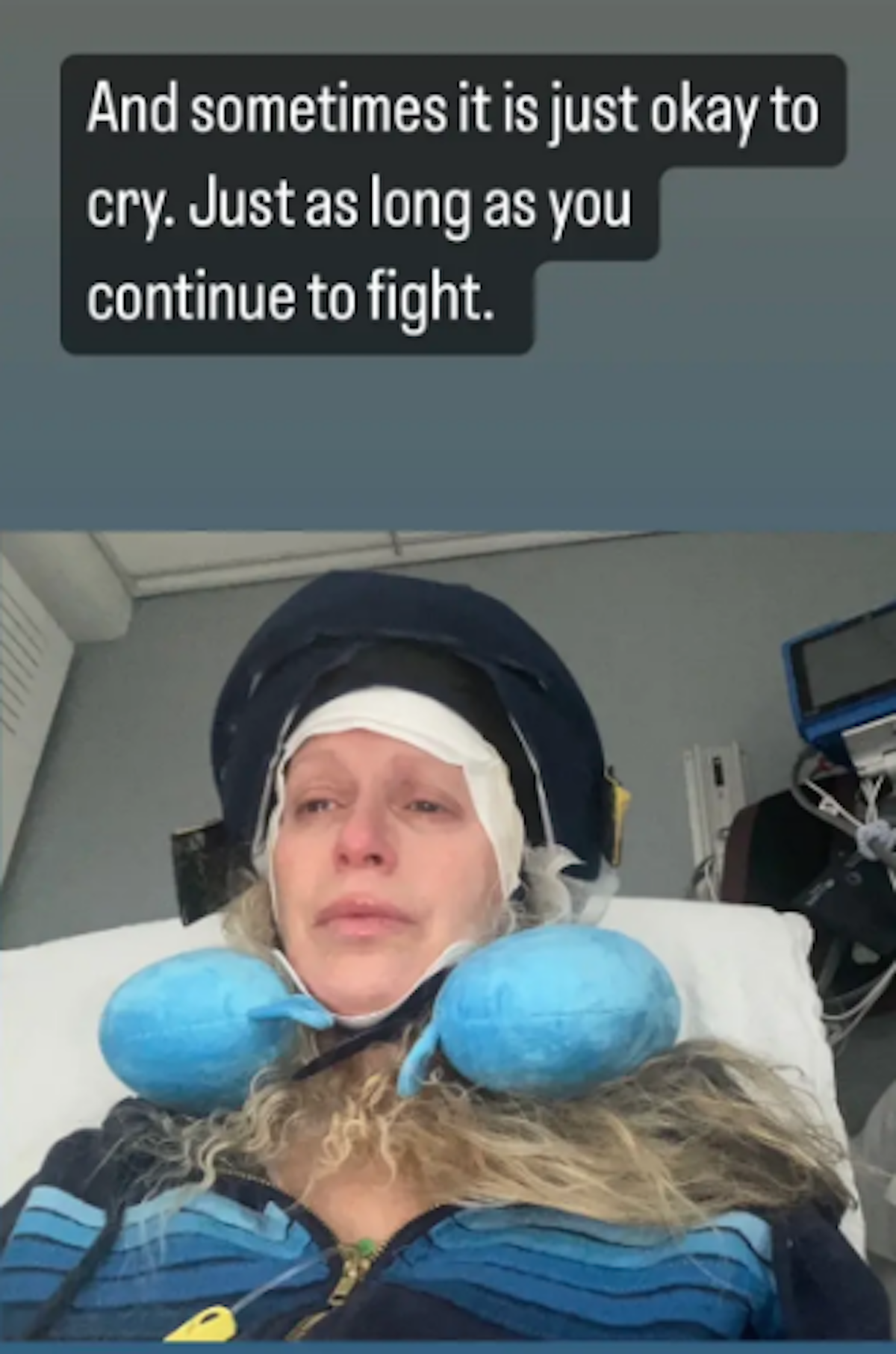Navigating Grueling Chemotherapy Side Effects
- ‘Today Show’ host Jill Martin Brooks, 47, crossed the emotional milestone of completing aggressive chemotherapy for her stage 2 breast cancer diagnosis.
- Martin’s journey included the grueling side effects of chemotherapy, which included nausea, vomiting, and hair loss.
- Chemotherapy stops cancerous cells from growing, dividing, and spreading to other organs. It works by traveling through the bloodstream, killing cancerous cells. However, the process also impacts healthy cells, leading to side effects.
- Your doctor will help you manage the side effects by either adjusting your medication or offering recommendations to help you cope, such as pressure bracelets and breathing exercises for nausea or cryotherapy, which minimizes hair loss.
- For more on how to manage chemotherapy side effects, check out SurvivorNet’s digital guide.
Tears of joy for “Today Show” host Jill Martin, 47, who passionately rang the chemo bell, signifying an emotional end to a grueling chapter of her cancer journey. She’s been open about how brutal her “Red Devil” chemo treatment has been on her physically and emotionally, even making her feel like a “shell of herself.”
Although this phase of treatment is behind her, Martin knows her breast cancer journey isn’t quite finished yet. However, it’s milestone moments like the end of chemo that make cancer warriors like Martin stronger and mentally equipping them to endure whatever else may be on the horizon.
Read MoreView this post on Instagram
With her hair pinned back, her body wrapped in a dark blue coat, and her feet snuggled into slippers, a makeup-less Martin gingerly walked towards the chemo bell and rang it with immense gratitude. With tears of joy flowing down her cheeks, Martin told a group of nurses standing alongside her cheerfully, “Thank you!”
The Instagram video is captioned with, “Today Show contributor Jill Martin rang the chemo bell, successfully closing a chapter in her breast cancer journey.” Supportive fans joined in on the celebration.
“It must be such a relief to get to the end of chemo,” Instagram user Janet Collins wrote.
“Jill, congratulations, and God be with you. You are brave and beautiful. You go, girl!!” Instagram user Vita Shiffer commented.

Chemotherapy is a standard part of most cancer treatment regimens. As practical as it can be at killing off cancer cells, it can have brutal side effects that include nausea, vomiting, and hair loss.
Helping Patients Cope with Chemotherapy
Managing Chemotherapy and Its Side Effects
Chemotherapy is an effective tool for oncologists to help treat cancer by stopping cancerous cells from growing, dividing, and spreading to other organs. Chemo works by traveling through the bloodstream, killing cancerous cells. However, healthy cells are also impacted in the process, leading to side effects.
Patients almost universally experience fatigue, often alongside gastrointestinal side effects, such as nausea. Doctors have many effective medications to combat chemo-induced nausea. “But mitigating that fatigue often depends on the patient,” says Dr. Renata Urban, a gynecologic oncologist at the University of Washington in Seattle.
“Neuropathy is probably one of the most challenging side effects,” says Dr. Renata Urban, a gynecologic oncologist at the University of Washington in Seattle. Neuropathy results from damage to the peripheral nerves. It usually resolves after chemotherapy treatment, but sometimes symptoms can persist. While it’s typically characterized by numbness or a pins-and-needles sensation in the hands and feet, neuropathy can have several different symptoms, including:
- Weakness in the hands or feet
- Stabbing or burning pain in the hands or feet
- Difficulty gripping, such as when holding a fork
- Difficulty with fine motor skills, such as writing or buttoning a shirt
Nausea and vomiting are common side effects of chemotherapy. When chemotherapy affects the rapidly dividing cells in the lining of the stomach, the resulting cellular havoc in the gastrointestinal tract can lead to side effects such as nausea and vomiting. However, doctors can help patients mitigate the hit with various medications before, during, and after treatment.
“Part of the chemotherapy prescription includes a set regimen of anti-nausea medications,” says Dr. Renata Urban, a gynecologic oncologist at the University of Washington in Seattle. “We also ensure that patients have medications at home that they can use should they develop nausea after treatment.”
Hair loss is another side effect of chemotherapy.
WATCH: Coping with hair loss.
“For cancer patients, losing one’s hair can be unbelievably stressful. To start with, the dread of losing one’s hair can lead to some sleepless nights and feelings of anxiety,” Dr. Samantha Boardman, a New York-based psychiatrist and author, told SurvivorNet.
Chemotherapy can cause hair loss. It usually begins about three to four weeks after chemotherapy and continues throughout treatment.
It happens because this treatment targets quickly dividing cells throughout the body. That includes cancer cells but also hair cells.
Most patients can expect regrowth four to six weeks after treatment. However, it is possible when your hair grows back, you may notice some changes in its color and texture.
RELATED: How are chemotherapy side effects managed for ovarian cancer treatment?
Tips to Navigating Chemo Side Effects
When dealing with fatigue, doctors don’t have an arsenal of weapons to combat fatigue in terms of prescription medications. However, you can do several things to help minimize the hit and restore your energy.
- Exercise: While it may be counterintuitive, physical activity can help alleviate side effects, especially fatigue. “Although ovarian cancer is not common, we often draw upon the experience of patients with breast cancer and colon cancer that have shown that physical activity can not only improve quality of life but may also have beneficial impacts on cancer outcomes,” Dr. Urban says.
- Eat well: Even though nausea may interfere with your ability to eat a healthy diet, it’s essential to ensure you’re eating appropriately, getting enough protein, and not losing weight. Not only will nourishing your body support your recovery, but it may also help you feel more energized.
- Sleep: Want to mitigate fatigue? Be sure to maintain your regular sleep-wake cycle while on treatment. Sticking to a set sleep schedule helps reduce fatigue by ensuring enough hours for your body to heal and restore itself each night. It may also help you recover more quickly by keeping energy levels high during the daytime.
Treating Neuropathy Symptoms
Doctors have several strategies for helping patients deal with this side effect. Once a patient begins experiencing the symptoms of neuropathy, they’ll be carefully monitored to make sure it doesn’t get worse. Before each chemotherapy infusion, the attending oncologist will assess whether the symptoms have progressed. If the symptoms worsen, they may adjust the dose or delay treatment. They may also try switching to another chemotherapy drug.
How to Get a Handle on Nausea
Most of these anti-nausea medications last for more than eight hours. One of the infusions commonly used reduces the degree of nausea for up to three days.
Complementary approaches may also be helpful. A few favorites:
- Ginger: Studies consistently show that ginger helps alleviate chemotherapy-induced nausea. The powerful herb appears to have an anti-spasmodic effect on the gut. Not a fan of raw ginger? Suck on ginger candy, sip ginger ale, or make a steaming cup of ginger tea.
- Pressure bracelets: at your local pharmacy, these bracelets provide consistent pressure on a particular acupressure point on the wrist to reduce nausea.
- Deep breathing: Moving air in and out of your lungs with a few deep breaths can help relieve nausea, particularly if you pair deep breathing exercises with meditation. It can also help you relax and release stress and anxiety.
WATCH: Managing chemo side effects.
Coping with Hair Loss
If losing your hair is a concern for you before cancer treatment, know you have options like wigs, hats, wraps, and scarves, among other things.
Another option that can minimize hair loss is cryotherapy, “just a fancy way for saying cold therapy,” says Dr. Renata Urban, gynecologic oncologist at the University of Washington in Seattle.
Cryotherapy involves wearing cold caps or special cooling caps before, during, and after each chemotherapy treatment.
Jill’s Resilient Cancer Journey
The brave and resilient journalist was diagnosed with stage 2 breast cancer last year. Her diagnosis came shortly after she underwent genetic testing and learned she carried the BRCA gene mutation, which increased her chance of developing cancer, including breast and ovarian.
After Brooks learned she carried the BRCA gene, she planned to get a preventative mastectomy to minimize her cancer risk. The procedure Brooks attempted to pursue is a prophylactic or preventive mastectomy, which removes breast tissue to prevent cancer from developing. This procedure is an option for women at higher risk, such as Brooks, who carried the BRCA gene mutation.

As the “Steals and Deals” guru said previously, she’s undergoing an aggressive form of chemo called “the red devil.” This form of chemo involves anthracyclines, an adjuvant chemotherapy treatment given after surgery. Research published in JACC: CardioOncology says anthracyclines offer a “10% improvement in disease-free survival and a 7% improvement in overall survival, compared with the initial standard regimen of cyclophosphamide, methotrexate, and 5-fluorouracil.”
Anthracycline and taxane (a class of chemotherapy drugs) have become a mainstay for breast cancer treatment. However, despite the effectiveness of these chemotherapy drugs, they come with intense side effects such as nausea, vomiting, and alopecia (hair loss), which helped give it its “red devil” nickname.

Brooks’ treatment also involved a double mastectomy (removal of both breasts), and she had 17 lymph nodes removed. She said she still has more treatment ahead of her with a hysterectomy to reduce her ovarian cancer risk further because of the BRCA gene mutation.
What To Ask Your Doctor
If you have been diagnosed with breast cancer, you may have questions about keeping your strength through treatment. Here are a few questions to help you begin the conversation with your doctor:
- What treatment will I be receiving?
- What side effects are associated with this treatment?
- Are there steps I can take daily to help minimize these side effects?
- What physical activity routine do you recommend for me during treatment?
- Do you have recommendations for someone who doesn’t particularly enjoy exercise?
- Can you recommend a dietician who can help me with healthy eating tips and weight maintenance?
- I’ve been having trouble sleeping. Do you have any treatment recommendations?
Learn more about SurvivorNet's rigorous medical review process.

